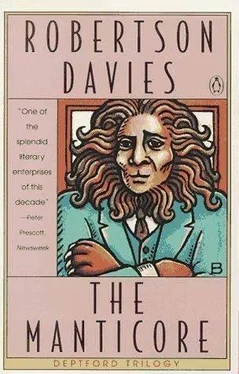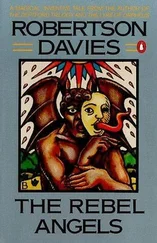Robertson Davies - The Manticore
Здесь есть возможность читать онлайн «Robertson Davies - The Manticore» весь текст электронной книги совершенно бесплатно (целиком полную версию без сокращений). В некоторых случаях можно слушать аудио, скачать через торрент в формате fb2 и присутствует краткое содержание. Жанр: Триллер, на английском языке. Описание произведения, (предисловие) а так же отзывы посетителей доступны на портале библиотеки ЛибКат.
- Название:The Manticore
- Автор:
- Жанр:
- Год:неизвестен
- ISBN:нет данных
- Рейтинг книги:3 / 5. Голосов: 1
-
Избранное:Добавить в избранное
- Отзывы:
-
Ваша оценка:
- 60
- 1
- 2
- 3
- 4
- 5
The Manticore: краткое содержание, описание и аннотация
Предлагаем к чтению аннотацию, описание, краткое содержание или предисловие (зависит от того, что написал сам автор книги «The Manticore»). Если вы не нашли необходимую информацию о книге — напишите в комментариях, мы постараемся отыскать её.
The Manticore — читать онлайн бесплатно полную книгу (весь текст) целиком
Ниже представлен текст книги, разбитый по страницам. Система сохранения места последней прочитанной страницы, позволяет с удобством читать онлайн бесплатно книгу «The Manticore», без необходимости каждый раз заново искать на чём Вы остановились. Поставьте закладку, и сможете в любой момент перейти на страницу, на которой закончили чтение.
Интервал:
Закладка:
The idea of putting sex aside never entered my head. It just happened, and I was not aware that it had become part of my way of living until it was thoroughly established. Pargetter may have had something to do with it. He was unmarried, and being blind he was insulated against a great part of the charm of women. He seized on me, as he did on all his students, with an eagle's talons, but I think he knew by the end of my first year that I was his in a way that the others, however admiring, were not. If you hope to master the law, he would say, you are a fool, for it has no single masters; but if you hope to master some part of it, you had better put your emotions in cold storage at least until you are thirty. I decided to do that, and did it, and by the time I was thirty I liked the chill. It helped to make people afraid of me, and I liked that, too.
Pargetter must have taken to me, though he was not a man to hint at any such thing. He taught me chess, and although I was never up to his standard I grew to play well. His room never had enough light, because he didn't need it and I think he was a little cranky about making people who had their eyesight use it to the full. We would sit by his insufficient fire in a twilight that could have been dismal, but which he contrived somehow to give a legal quality, and play game after game; he sat fatly in his arm-chair, and I sat by the board and made all the moves; he would call his move, I would place the piece as he directed, and then I would tell him my counter-move. When he had beaten me he would go back over the game and tell me precisely the point at which I had gone wrong. I was awed by such a memory and such a spatial sense in a man who lived in darkness; he was contemptuous of me when I could not remember what I had done six or eight moves back, and of sheer necessity I had to develop the memory-trick myself.
He really was alarming: he had three or four boards set up around his room, on which he played chess by post with friends far away. If I arrived for an early tutorial he would say, "There's a postcard on the table; I expect its from Johannesburg; read it." I would read a chess move from it and make the move on a board which he had not touched for perhaps a month. When my tutorial was finished he would dictate a counter-move to me, and I would rearrange the board accordingly. He won a surprising number of these long-distance, tortoise-paced games.
He had never learned Braille. He wrote in longhand on paper he fitted into a frame which had guide-wires to keep him on the lines, and he never seemed to forget anything he had written. He had a prodigious knowledge of law books he had never seen, and when he sent me, with exact directions, to his shelves to hunt up a reference, I often found a slip of paper in the book with a note in his careful, printlike hand. He kept up with books and journals by having them read to him, and I felt myself favoured when he began to ask me to read; he would make invaluable comment as he listened, and it was always a master-lesson in how to absorb, weigh, select, and reject.
This was precisely what I wanted and I came almost to worship Pargetter. Exactitude, calm appraisal, close reasoning applied to problems which so often had their beginning in other people's untidy emotions acted like balm on my hurt mind. It was not ordinary legal instruction and it did not result in ordinary legal practice. Many lawyers are beetle-witted ignoramuses, prey to their own emotions and those of their clients; some of them work up big practices because they can fling themselves fiercely into other people's fights. Their indignation is for sale. But Pargetter had honed his mind to a shrewd edge, and I wanted to be like Pargetter. I wanted to know, to see, to sift, and not to be moved. I wanted to get as far as possible from that silly boy who had not realized what a swordsman was when everybody else knew, and who mooned over Judy Wolff and was sent away by her father to play with other toys. I wanted to be melted down, purged of dross, and remoulded in a new and better form; Pargetter was just the man to do it. I had other instructors, of course, and some of them were very good, but Pargetter continues to be my ideal, my father in art.
11
I wrote to Father every week and grew aware that my letters were less and less communicative, for I was entering a world where he could not follow. I visited Canada once a year, for as short a time as I could manage, and it was when I was about to enter my third year at Oxford that he took me to dinner one night, and after some havering which I realize now was shyness about what he was going to say, he made what seemed to me to be an odd request.
"I've been wondering about the Stauntons," he said. "Who do you suppose they could have been? I can't find out anything about Father, though I've wormed out a few facts. He graduated from the medical school here in Toronto in 1887, and the records say he was twenty then, so he must have been born in 1867. They really just gave doctors a lick and a promise then, and I don't suppose he knew much medicine. He was a queer old devil, and as you probably know, we never hit it off. All I know about his background is that he wasn't born in Canada. Mother was, and I've traced her family, and it was easy and dull; farmers culminating in a preacher. But who was Dr. Henry Staunton? I want to know. You see, Davey, though it sounds vain, I have a strong hunch that there must be some good blood somewhere in our background. Your grandfather had a lot of ability as a businessman; more than I could ever persuade him to put to work. His plunge into sugar, when nobody else could see its possibilities, took imagination. I mean, when he was a young man, a lot of people were still rasping their sugar off a loaf with a file, and it all came from the Islands. He had drive and foresight. Of course lots of quite ordinary people have done very well for themselves, but I wonder if he was quite ordinary? When I was in England during the war I wanted to look around and find out anything I could, but the time was wrong and I was very busy with immediate things. But I met two people over there at different times who asked me if I were one of the Warwickshire Stauntons. Well, you know how Englishmen like it when Canadians play simple and rough-hewn, so I always answered that so far as I knew I was one of the Pitt County Stauntons. But I tucked it away in the back of my mind, and it might just be so. Who the Warwickshire Stauntons are I haven't the slightest idea, but they appear to be well known to people who are interested in old families. So, when you go back to Oxford, I'd like you to make some enquiries and let me know what you find. We're probably bastards, or something, but I'd like to know for certain."
I had long known Father was a romantic, and I had once been a romantic myself – two or three years ago – so I said I would do what I could.
How? And what? Go to Warwickshire and find Stauntons, and ask if they had any knowledge of a physician who had been Pitt County's foremost expert on constipation, and to the end of his days a firm believer in lignum vitae sap as a treatment for rheumatism? Not for me, thank you. But one day in the Common Room I was looking through the Times Literary Supplement , and my eye fell on a modest advertisement. I can see it now:
Genealogies erected and pedigrees searched by an Oxonian
curiously qualified. Strict confidence exacted and extended.
This was what I wanted. I made a note of the box number, and that night I wrote my letter. I wanted a pedigree searched, I said, and if it proved possible to erect a genealogy on it I should like that, too.
I don't know what I expected, but the advertisement suggested a pedant well past youth and of a sharp temper. I was utterly unprepared for the curiously qualified Oxonian when he arrived in my study two days later. He seemed not to be much older than myself, and had a shy, girlish manner and the softest voice that was compatible with being heard at all. The only elderly or pedantic thing about him was a pair of spectacles of a kind nobody wore then – gold-rimmed and with small oval lenses.
Читать дальшеИнтервал:
Закладка:
Похожие книги на «The Manticore»
Представляем Вашему вниманию похожие книги на «The Manticore» списком для выбора. Мы отобрали схожую по названию и смыслу литературу в надежде предоставить читателям больше вариантов отыскать новые, интересные, ещё непрочитанные произведения.
Обсуждение, отзывы о книге «The Manticore» и просто собственные мнения читателей. Оставьте ваши комментарии, напишите, что Вы думаете о произведении, его смысле или главных героях. Укажите что конкретно понравилось, а что нет, и почему Вы так считаете.












